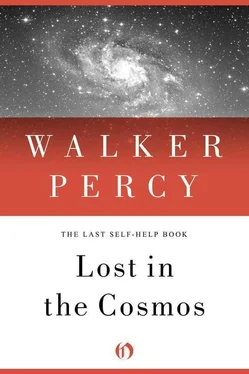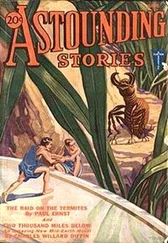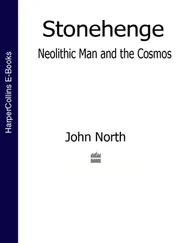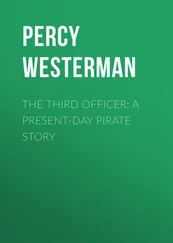The Captain has formed the habit of sitting on the hillside above the cave, a warm place fragrant with rabbit tobacco and scuppemong and the pine-winey light. It is a favorite meeting place on Sunday mornings of the unbelievers — non-churchgoers and dissidents of one sort and another — while the tiny congregations of Catholics and Protestants hold services. There is even talk of a temple, but the five Jews, one orthodox, one reformed, one conservative, one humanist, and one Yemenite Israeli, cannot get together.
The Captain, two covites (mountain men still wearing bib overalls in the old style), two ex-Atlantans (middle-management types from high-tech industries), three fem-libbers (including Kimberly) who are sick and tired of both the male-dominated space age and the male-dominated clergy, a few twenty-sixth-century hippies, vagabonds from God knows where — gather companionably while the old abbot celebrates Mass below with his two young servers. They, the servers, are white, none other than Siddhartha and Carl Jung, each of whom has already received minor orders. The two black monks are gone. Amos died. Andy discovered his roots in nearby Alabama, resigned his priesthood, and joined the Shiloh Baptist church, a tiny black Baptist community.
“Why don’t you come to Mass?” asked Dr. Jane Smith.
“My cathedral is the blue sky. My communion is with my good friends,” replied the Captain.
“Bull,” said Dr. Jane Smith.
One of the covites, Jason McBee, produces a fruit jar of corn whiskey, by no means the white-lightning of the old bootleggers, but a mellow-gold confection, aged in the wood, smooth as honey, and fiery as the October sun. The Captain takes a long pull.
“Ah,” he says.
The “heathen,” as they call themselves, begin their usual good-natured bickering mostly about political and agricultural subjects — whether to start a corn co-op, what to do about a rumored Celtic enclave across the old Carolina line, a growing community with a reputation for violence and snake-handling.
Indeed, one of the covites, the stranger with Jason McBee, has come from Carolina as a kind of emissary. He allows that he wishes to shake their hands in friendship. He does. They drink. The mountain men hunker down. The others sit down. The Carolinian has come to propose a political alliance.
An alliance of whom against whom? the Captain wants to know.
Of us against them.
Who’s us?
I’m talking about us rat cheer.
You mean us white folks?
You got it.
No blacks?
No way.
Jews?
We’re talking Caucasian. Look at them over there, he says, nodding toward the five Jews.
What about them?
They’re conspiring.
Conspiring? Conspiring to do what?
Take over.
They’re not conspiring. They’re arguing. How about the Catholics down there?
We’re talking American. No foreign potentates.
America? What America? There is no America.
Us. American and Christian.
I see. The Captain takes another drink from Jason McBee’s fruit jar and seems to fall into deep thought. Then he begins to laugh.
The others look at him in astonishment. When he catches sight of their faces, he laughs all the harder.
Presently Jason McBee asks him: What you laughing at, Captain?
Nothing much, says the Captain. I was just thinking: Jesus Christ, here we go again.
Below, the old abbot, now withered as a stick, turns from the altar to face the people.
ABBOT: Lord, have mercy on us.
PEOPLE: Christ, have mercy on us.
ABBOT: Lord, have mercy on us.
One of the hippies on the hillside shakes his head. I never did like Sunday, he says. “Sunday mornin’ comin’ down.” Softly he sings an old twentieth-century song:
On the Sunday morning sidewalks
Wishing, Lord, that I was stoned
Makes a body feel alone
And there’s nothing short of dying
Half as lonesome as the sound
On the sleeping city sidewalks
Sunday mornin’ comin’ down.
Let’s move on, he says to his comrades. They do.
The Captain rises creakily, takes a pull of the golden liquor.
“I got to get back to the cabin,” he says to no one in particular. “Jane will be looking for me. I got a pig in my smoker. I use pecan for smoking. Beats hickory.”
One day, in New Ionia or Tennessee, as the case may be, a message is received on the Copernicus antenna, evidently sent many times, for, after it was recorded, it was repeated again and again. Its source was nothing else than an ETI (extraterrestrial intelligence), the first after all these hundreds of years of monitoring.
Question: Where would you rather be when the message is received—
(1) Tennessee?
(2) New Ionia?
The Message:
Message to Star: G2V, r = 9.844 kpc, 0 = 00°05′24'', 0 = 206°28′49'' (our sun) Planets: a = 1.5 × 10 13cm, M = 6 × 10 27g, R = 6.4 × 10 8cm, p = 8.6 × 10 4, p = 3.2 x 10 7s (the inner planets of the solar system)
Repeat. Do you read? Do you read? Are you in trouble? How did you get in trouble? If you are in trouble, have you sought help? If you did, did help come? If it did, did you accept it? Are you out of trouble? What is the character of your consciousness? Are you conscious? Do you have a self? Do you know who you are? Do you know what you are doing? Do you love? Do you know how to love? Are you loved? Do you hate? Do you read me? Come back. Repeat. Come back. Come back. Come back.
(CHECK ONE)
*The adventures recounted here owe something to Walter M. Miller’s extraordinary novel, A Canticle for Leibowitz, from which I have borrowed Leibowitz and the state of Utah.












